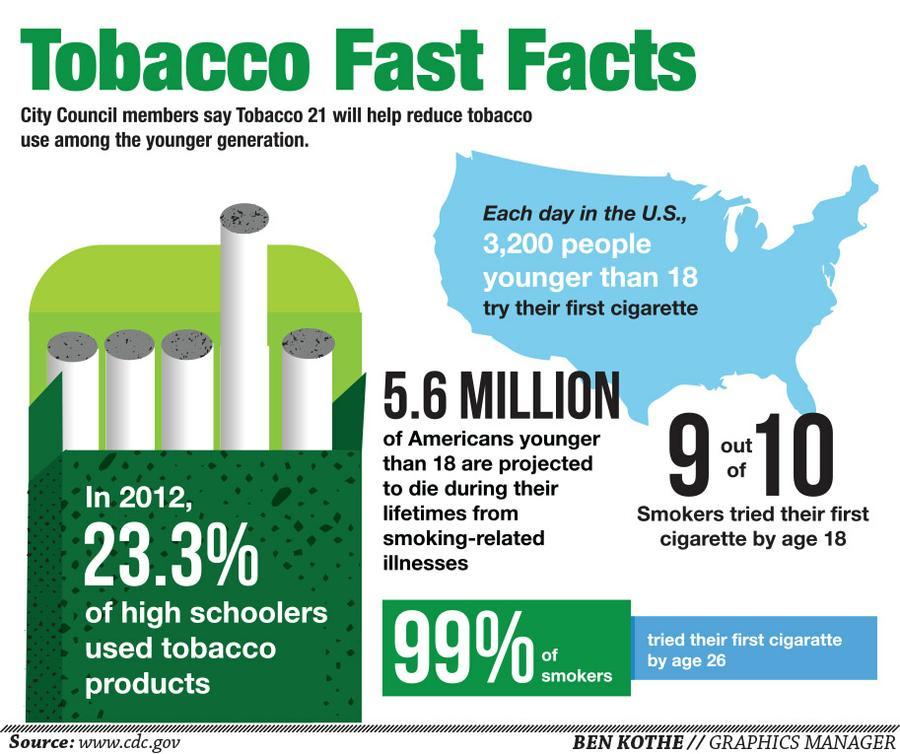Anger and disappointment arose from many students and Columbia residents almost as soon as City Council passed the Tobacco 21 initiative on the evening of Dec. 15. If current petition efforts are successful, the controversial law could be placed on the ballot.
Tobacco 21 made the sale of tobacco products in Columbia illegal to those under the age of 21. Additionally, City Council passed ordinances regulating e-cigarettes. Former First Ward Councilwoman Ginny Chadwick sponsored the ordinances. [She resigned from her council seat Jan. 5 amid a recall effort after she voted against a bill decriminalizing small amounts of marijuana cultivation.](https://www.themaneater.com/stories/2015/1/7/chadwick-resigns-allow-special-election-april/)
Spencer Pearson, Mid-Missouri NORML vice president and host of the Bowl After Bowl podcast, said he was one of the upset Columbia residents. He quickly started organizing petition efforts to repeal these laws.
“I also don’t think that the law accomplishes what it pretends that it will accomplish,” Pearson said. “It hurts our local businesses and tax revenue and doesn’t really stop anybody from getting cigarettes.”
He first organized a referendum petition. A referendum petition does not repeal a law but could suspend or annul a law that has not yet gone into effect. To be successful, the petition needed to obtain 3,209 valid voters’ signatures. However, Pearson ultimately fell short of that goal.
Pearson attributes the shortage of signatures to the 20-day limit set on referendum petitions and time of year the ordinance was passed. Because Tobacco 21 became law close to the holiday season, he said many potential signers weren’t in town.
“It was the worst possible time in the entire year to start trying to get 3,000 signatures on a petition,” Pearson said. “There were a lot of factors working against us.”
The 20-day time limit starts once the legislation passes, meaning the clock started ticking after the Dec. 15 City Hall meeting.
“Twenty days is an incredibly short amount of time to be able to mobilize,” Pearson said. “We didn’t even have time to write and start printing out petitions until, you know, four or five days in.”
Currently, Pearson said, a draft initiative petition is being edited. An initiative petition that garners the requisite number of signatures creates a measure citizens vote on in an election. Pearson said he hopes the petition will be finished within the next couple of weeks, in order to have it on the April ballot.
Pearson said the initiative petition should be achieved easier than the referendum petition for various reasons.
For instance, since three tobacco-related ordinances passed, in order to repeal them all, they had to have three different referendum petitions.
With the initiative petition, however, they are able to write a new ordinance, requiring only one signature per person.
The initiative petition also doesn’t have a specified deadline to be valid. Pearson said this gives the writers more time to plan out the petition, in order to have a more coordinated approach.
They also only need 2,567 valid voters’ signatures for the initiative petition, nearly 650 less than the referendum petition.
Fourth Ward Councilman Ian Thomas said petitions are an important part of the checks and balances on government power, but he would prefer to see the petition fail to gather adequate signatures.
“I believe we have passed an important piece of legislation that will benefit the health of Columbians and advance the national public health movement,” Thomas said in an email.
“While a few people feel very strongly about this issue, I do not believe there is enough opposition to the raising of the legal age of tobacco purchase to 21 to enable them to collect the required number of signatures without enormous effort,” he said. “During the campaign, I did not hear a lot of opposition — there were the convenience store owners and a few people who felt government was overreaching.”
Third Ward Councilman Karl Skala said Tobacco 21 was far from a split decision, passing with a vote of 6-1.
“When it comes to individual issues, I think that there is a danger of legislating by petition, and that’s not why we elected people to represent their constituents,” Skala said.
Skala stands by his decision to vote in favor of this legislation.
“This was a public health decision, trying to interrupt the supply chain to keep both tobacco and vaping products, which I see as an enticement toward tobacco for youth,” Skala said.
MU senior Jake Loft, who is running for the First Ward seat vacated by Chadwick, was instrumental in petition efforts, Pearson said.
“One of the things that I’m running on is individual liberty,” Loft said. “I believe that the right for an adult to purchase tobacco and the right for businesses to sell tobacco to a person under 21 is something that needs to be protected. As a city councilman, I (would) work to protect that.”








